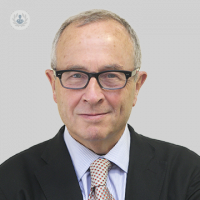What is Parkinson's disease, its symptoms and treatment
Written by:
What is Parkinson's?
Parkinson's is a slowly progressive neurologic disease in adults, characterized by the deposition of a protein called synuclein in the brain and sometimes also in peripheral tissues. The cause of Parkinson's is unknown, although in 5% of cases are hereditary. In Parkinson's there is a decrease in dopamine which causes problems patient mobility.
What are the core symptoms of Parkinson's?
Parkinson's disease has varied symptoms, is what is called a very heterogeneous disease. You can start at age 40 or you can start at 70 or 80 years. The major symptoms are what we call motor symptoms such as tremor of the arms or slowness of movement. Other characteristic symptoms are what we call non-motor such as sleep difficulties, memory problems, mental depression or difficulty with urination or constipation.
How do we differentiate a tremor of Parkinson other tremors associated with age?
In Parkinson's tremors improve when the subject performs a movement, also are usually accompanied by slowness and clumsiness. In elderly tremors other we observed a worsening with activity such as drinking a glass of water or eat soup with a spoon. Sometimes this separation is very difficult and we must resort to a scanner dopa-mine. In Parkinson's brain dopamine is reduced while the other tremors not.
How is Parkinson's treated?
The medical treatment of Parkinson's based on drugs that increase brain dopamine. These drugs in the early stages are administered orally, but in later stages the sometimes administered subcutaneously or via intra intestinal. In advanced stages also we have surgical therapies such as deep brain stimulation. This treatment involves the implantation of electrodes in the brain connected to an electrical stimulator. This treatment has had a major impact on the quality of life of patients but you must use it only in those patients in whom medical treatment orally is not effective. It should be remembered that complementary therapies such as physiotherapy, speech therapy or rehabilitation, for example, are also very useful and necessary for a comprehensive treatment of the disease.
You can delay its progression?
To delay its progression exist today several studies with anti synuclein vaccines that aim to reduce the concentration of this protein in the brain. We believe that these therapies result in a slowing of the disease. In any case slow or cure Parkinson is the most important research challenge that we have today.



